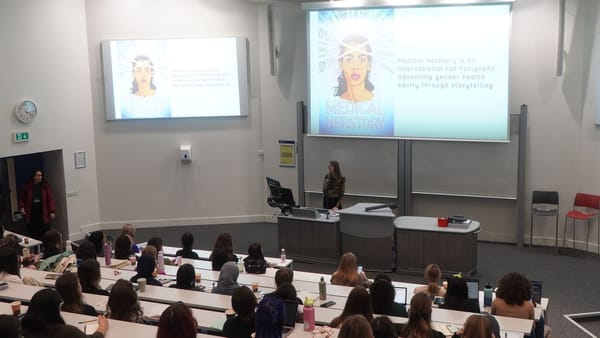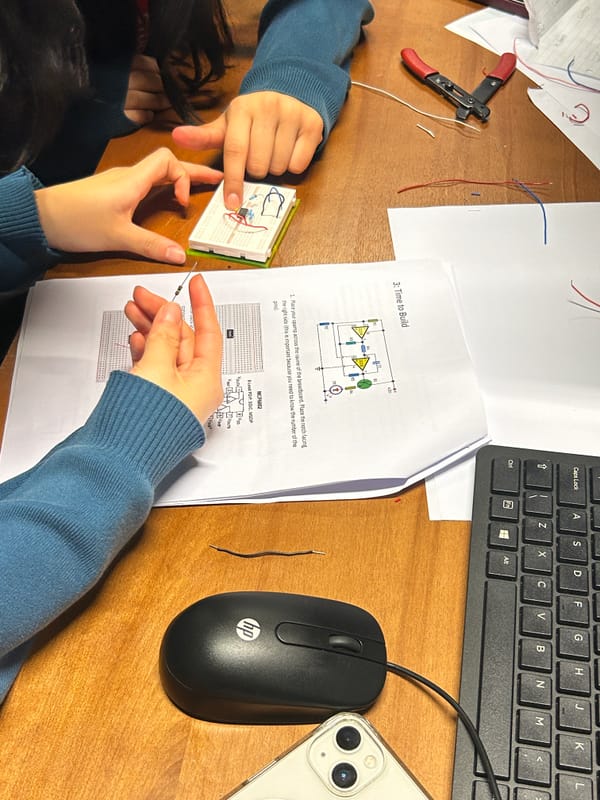Internship decisons: City? ... Or Charity?
Already secured a city internship for summer ‘13? Or perhaps you’re looking to work in the third sector? Caroline Wood compares the two

Intro
Everyone wants one. Some people seem to want one more than they want their degree. And some lucky people alrealy have one. Gone are the days when Imperial students wasted their summers away in Kavos indoors watching Crystal Maze repeats, in these ‘tough times’ it’s all about the summer internship.
But what makes a good internship? What do we want to gain from a summer of work? And where can we find the best experiences? We all know that the big city firms offer up healthy pay packets in exchange for long hours and the oportunity to sample the life of an analyst. But how do internships elsewhere compare. Are internships in the not-for-profit and charity sectors valuable too? Read these reports from Imperial students who have sampled both to find out...
City
4th year Chemist
Bank of America Merrill Lynch, London
What aspect of your internship did you enjoy most?
Meeting and working with peoplemy age, who had the same ambitions and goals as me. Also, getting help and guidance from people who had been working at the company for a while. It felt very friendly.
What aspect of your internship did you dislike most?
The limited number of full time offers available often meant that stress levels were high. There was a lot of pressure to produce high quality work, and this often meant working long hours. Having said that, the intensity wasn’t as high as Imperial; managers are very wary of burnout, and there is an ethos of making the job sustainable in the long term (I think this is more of a London thing rather than an industry thing).
Did you feel your work was valuedby your team?
As an intern it is difficult to produce “valuable” work because you probably don’t have the skill set required yet. What is really valued is the amount of effort you put into the work, which is reflected in its quality. Giving interns work to do actually tends to slow full-time staff down, but it does provide them with an idea of what it would be like to work with you, which is the most important thing, as the rest can be learned.
Did your internship gave your the opportunity to develop your skills and increase your knowledge?
The internship was a form of immersive learning. No academic course can prepare you for the skills you learn when you are on the job. This is part of the reason why there are no prerequisites or degree requirements for the job. I learned valuable life skills very quickly, which I believe were more valuable than the technical skills I picked up.
Would you like to work at the organisation full time? Why / Why not?
I loved my internship and got alongwith my team really well. The culture of the firm was very friendly and it was a great place to spend my summer. I accepted an offer to work full-time and I am really looking forward to going back.
I don’t think that the work is for everyone and there are downsides to the job. But there are downsides to every job, and for me these were far outweighed by the fact I am working on something I enjoy, the opportunities the job offers, and the people I will be working with day-to-day.
4th year Physicist
Bank of America Merrill Lynch, London
What aspect of your internship did you enjoy most?
The fact that the work I was doing actually went into active projects that would be seen by senior management and clients. It made a great change from say, writing a lab report, where the experiment has been done a hundred times previously, everyone already knows the outcome and there is little space for individuality.
What aspect of your internship didyou dislike most?
Deadline changes! Now and thenthe piece of work you had planned to finish for the end of the week could be required the very next morning – something that doesn’t really happen at university and that takes a bit of getting used to.
Did you feel your work was valued by your team?
Gradually, yes. Due to the nature of the work, the team you’re with can’t give you free reign with an assignment straight off the bat, however as the summer progressed I was allowed to make more of my own judgements on various aspects of a project.
Did your internship give you the opportunity to develop your skills and increase your knowledge?
Yes, a huge amount of information was available and had to be applied continuously throughout the summer. The hours may seem very tough to some, however in practical terms I was able to gain so much more experience within a single summer compared to an ‘ordinary’ 9-5 job.
Would you like to work at the organisation full time? Why / Why not?
I enjoyed working with the people within my team and the sector itself interests me greatly so I would be more than happy to go back.
4th year Chemist
Accenture, London
What aspect of your internship did you enjoy most?
Working with a senior member of the firm to help compile some initial information for a client bid. The client project was in Africa and so I was tasked with compiling information about related work Accenture has done in Africa in the past. It meant I needed to be resourceful, show initiative and also got the chance to speak with colleagues in places such as Johannesburg and Lagos.
What aspect of your internship did you dislike most?
As consultants often work on their client’s sites, I was based in the less than exotic Park Royal (at the end of the West bound Piccadilly line). This meant I didn’t get to join all of the intern social events in the city and sometimes felt a bit isolated
Did you feel your work was valued by your team?
Kind of. Although I felt that I didn’t have enough technical knowledge to add value most of the time
Did your internship give you the opportunity to develop your skills and increase your knowledge? In some areas, definitely yes. However, at times I felt like I was being given mundane tasks such as preparing ppt. slides and updating spreadsheets that weren’t giving me much insight into how the firm operated.
Would you like to work at the organisation full time? Why / Why not?
The people area great and the work is varied and can be interesting. Consulting work is highly dependent on your team, location and project and this gamble would be one of the things that would deter me from going back.
Charity

3rd year Biologist
Wellcome Trust
What aspect of your internship did you enjoy most?
I enjoyed the freedom and lack of hierarchy in the workplace. I was able to ask anyone questions and they were willing to talk to all the interns.
What aspect of your internship did you dislike most?
I disliked the lack of structure in certain aspects of the internship. For example at times I felt I was doing filler-jobs that weren’t properly thought through.
Did you feel your work was valued by your team?
I do feel my work was valuedhowever I feel I could have done more.
Did your internship give you the opportunity to develop your skills and increase your knowledge?
Yes it did. I was surrounded by intelligent people, many of them extremely knowledgeable in fields I would like to go into.
Would you like to work at the organisation full time? Why / Why not?
I would definitely like to work for the organisation full-time. The Wellcome Trust funds biomedical research and although I’ve enjoyed my degree , I don’t want to become a researcher. Working in science, but not at the bench really appeals to me.
3rd year Biomedical Engineer
Ethical Internship with AHPN, the African Health Policy Network
Rhiannon spent a six week placement with AHPN, the African Health Policy Network as part of the Imperial Hub ethical internship scheme. Here’s her report:
I took part in the Ethical Internship Scheme just after completing my second year of a Biomedical Engineering degree at Imperial College London. I applied to the scheme as I was keen to explore slightly different career options than those of my course mates, i.e. I don’t want to be a research scientist, doctor or banker! I knew I wanted to bridge a gap between the scientific elite and the wider community, educating those who otherwise would be fearful of change and development.
After the Easter networking event for all Student Hubs interns, I knew I’d met the type of people I would like to work with one day: they were dynamic, fascinating and impassioned people who weren’t afraid to play silly games and express themselves unashamedly.
My six week placement was with AHPN, the African Health Policy Network, a charity that seeks to represent the healthcare needs and opinions of the Black African population living in the UK, as well as disseminating guidance and education concerning six key health care issues, known to affect the Black African community disproportionally (HIV, Tuberculosis, Breast and Prostate Cancer, Mental Health, Stroke and Diabetes) My main project was to re-draft a report published by BHIVA, the British HIV Association, which outlined the latest treatment guidelines, making it more accessible and relevant to community members. Processing the report in its original form was quite tough going, (I got the sense they’d been waiting for a scientist like me to come aboard!) but with a little bit of online research I reached the bare bones of the report.
It was important information, previously buried under scientific vocabulary; it felt great to dig it out to genuinely help the lives of others for the long term. I suppose I used my scientific powers for good this time!.
3rd year Mathematician
Ethical Internship with CharityComms
What aspect of your internship did you enjoy most?
The independence I was given. The trust too. I was PA to Director and Project Manager. The project I was in charge of aimed at analysing where communication departments sit within UK charities, how they are run as well as how they relate to the other core functions within the organization.
What aspect of your internship did you dislike most?
The team I joined was rather small; hence we all had to contribute to the tedious yet necessary tasks such as mass emailing or database cleaning.
Did you feel your work was valued by your team?
Definitely.
Did your internship give you the opportunity to develop your skills and increase your knowledge?
Yes, I was given a lot of autonomy and freedom in my work, and could interact with member organisations without direct supervision, which felt very gratifying.
Would you like to work at the organisation full time? Why / Why not?
Not in the near future, there’s a great deal of things I would like to try my hand at first! However I have thoroughly enjoyed being an active part of such a dynamic team and don’t exclude the possibility of joining a similar professional framework at some point in the future.
Conclusion?
This very unofficial comparison of internships within different sectors draws out, for me, one key point. We like internships where we feel we are gaining valuable experiences. That may be networking with a team in a sector where we know we want to work, or having the opportunity to apply our skills to novel situations outside of the library/lab. As long as we are learning, gaining skills and expanding our knowledge we generally seem quite satisfied.
If you know what you want to do then it’s obviously best to seek an internship in that particular area. However, if you are not sure what career path you want to take, does it really matter where you intern? In my opinion, not really.
A good and useful experience is worthwhile whether it’s with a corporate or a charity. After all, that’s what an internship is all about right? Trying new things to see what parts you like and what parts you don’t.
_If you are still thinking about what to do this summer and fancy trying something a bit different, you can still apply to the Imperial Hub Ethical Internship scheme before 5pm on Monday 21st Feburary. More details can be found by searching “Student Hubs Ethical Internships” or by checking out the Imperial Hub Facebook page. _








